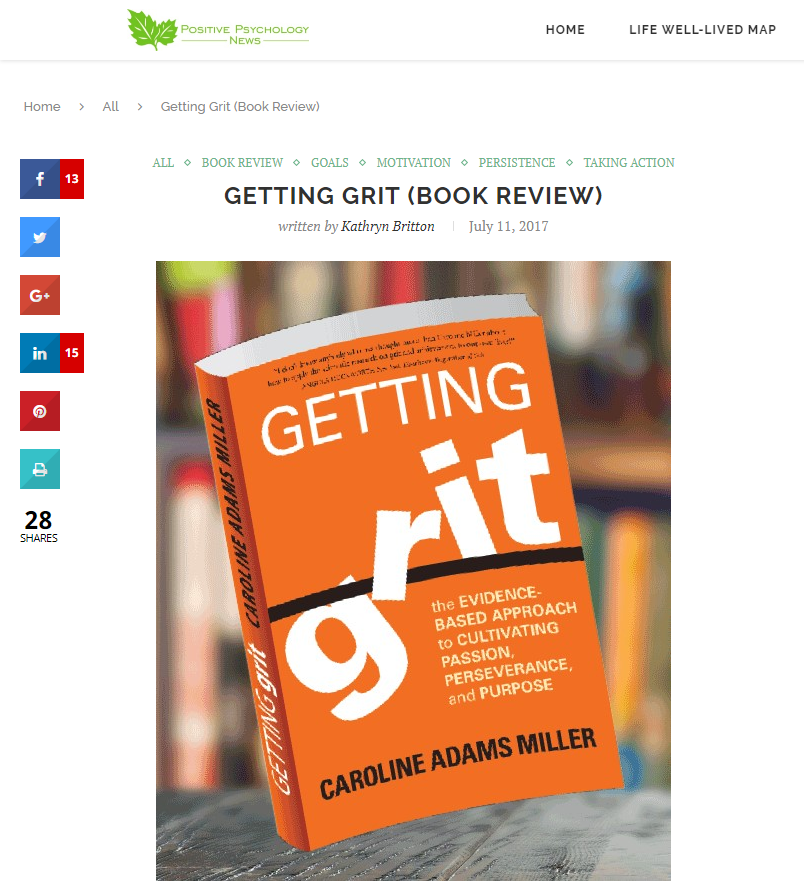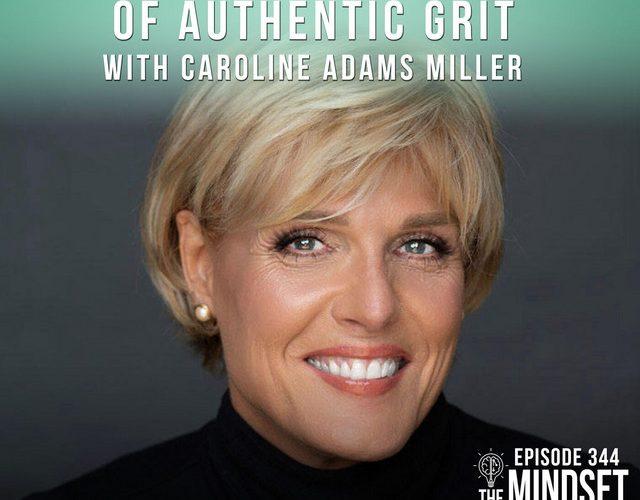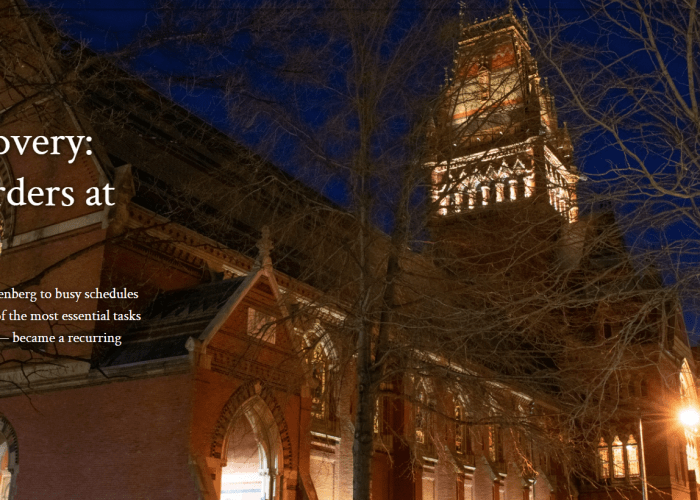July 11, 2017
By Kathryn Britton
When we learn how to set the right goals and see them through to the finish line, become comfortable with discomfort, and use setbacks as springboards, we can live with passion, purpose, and perseverance.” Getting Grit, p. 5
Grit came to the forefront last year when Angela Duckworth published a book describing the research on passion and perseverance in the pursuit of long-term goals. Duckworth told stories about grit in action and grit in the making. Since then there has been lively discussion around questions such as
- Is grit always good? If not, how can people recognize when it has gone awry?
- Is grit malleable? If so, what specific things can people do to build more beneficial grit?
- Is there enough grit out there to help us deal collectively with the immense challenges of our age?
Enter Caroline Miller’s new book, Getting Grit. Miller builds on the goal-setting foundation she established in Creating Your Best Life to address these questions in a clear and compelling way. As a striver herself and a performance coach, she has seen grit develop, sometimes go awry, and sometimes drive amazing long-term progress toward very hard goals. Miller’s definition of authentic grit will give you a hint about her answers to these questions.
“Authentic grit is the passionate pursuit of hard goals that awes and inspires others to become better people, flourish emotionally, take positive risks, and live their best lives. For me, grit isn’t a positive unless it is a force for good.”Getting Grit, pp 14-15
A Coach Between Book Covers
Getting Grit is like finding a grit coach between book covers. If you believe you need clearer goals, greater motivation to follow them through, and help dealing with discomfort and setbacks, you might hire someone like Miller to be your performance coach. If that’s out of reach, start with Miller’s new book and work through the exercises she provides to build this complex quality. Keep in mind Miller’s important caveat:
“Developing authentic grit means experimenting with these ideas, practicing them over and over, learning what works through trial and error, and evolving from a cook who masters one behavior at a time to a master chef who blends them all together repeatedly with hard work and for the right reasons.” Getting Grit, p. 91
I firmly believe in thinking of life as a series of experiments. Here are grit ingredients she suggests including in your own experiments with baking a grit cake (metaphor Miller’s).
-
- Building Passion to Fuel Purpose: Identifying a harmonious passion, making sure it doesn’t become an obsessive passion. She draws on the research of Bob Vallerand, who defines harmonious passion as freely chosen for the pleasure that comes from the activity, not to please someone else or outshine someone else.
- Happiness: Taking intentional action to support personal happiness, because “… we don’t become happy after we succeed at something, but rather succeed precisely because we are happy first.” (p. 107)
- Goal-setting: Goals direct attention toward what matters, energize people, prolong effort, and lead to self-discovery of skills and resources.
- Self-Regulation: How do you set up conditions that support will power and help you say “no” when you need to do so? The exercises in this chapter includes a discussion of fathers playing with their children. A little bit of roughhousing helps children learn how to cope with frustration.
- Risk-Taking: A lot of people talk about taking risks, but not many get this specific about how. I appreciated Miller’s first suggestion: “Ask yourself ‘Why not?’ instead of ‘Why?’” She explained that gritty people don’t endlessly stare at their options waiting for the perfect choice to emerge. They move out, ready to learn from what happens.
- Humility: When I thought of grit as a compound strength, it didn’t occur to me to include humility, so I read this chapter with particular interest. Miller warns people about selfie grit earlier in the book. She tells the story of a young man from Haiti brought to school in the United States who says, “I don’t understand how anyone can say they are self-made. I couldn’t have accomplished anything without so many people doing things for me … How can you make yourself successful all by yourself?” One of the exercises in this chapter is to “Toot someone else’s horn.” (p. 160 & p. 166).
- Perseverance: This chapter describes struggling well, overcoming procrastination, and numerous pragmatic ways to build the ability to persevere. One theme in the exercises is to be around other people who persevere. Perseverance is contagious.
- Patience: Here’s another that I didn’t expect, but it makes good sense. Powerful goals aren’t achieved all at once, and they aren’t achieved without discouraging setbacks. I’m reminded of my father and his brother both applying for Rhodes scholarships after World War II. Both were turned down. My uncle moved on to other things, but my father interviewed members of the selection committee to find out where he fell short. He spent two years working on the qualities they wanted to see and was accepted the second time he applied. My birthplace, Oxford England, is evidence of his patience and his grit.
Hesitations
In her book and her earlier TEDx talk, Miller expresses deep concern that we are experiencing a grit deficit right now and that the Millennial Generation has been bubble-wrapped to the point that they aren’t learning to do hard things. There is a clear suggestion that helicopter parents are standing between them and things they need to learn.
I have a little hesitation about the urgency of Miller’s argument. I do agree that my generation of parents has been over-protective, but in my opinion it’s a temporary over-correction for too little protection in preceding generations. When my mother was growing up, children had great freedom starting at very early ages, shooed outside, and called in for meals. Imagine what they learned from so much independence! But there is a family story about my father falling into an irrigation ditch at the age of 4 while playing with his 6- and 7-year-old siblings. He only survived the fast-flowing water because his coat filled up with air and kept him afloat until the current pushed him close to a bank so that his siblings could pull him out. At least one of my mother’s cousins drowned in an irrigation ditch. People no longer routinely leave a 7-year-old in charge of two younger siblings, and I don’t find that a bad thing.
Perhaps Getting Grit will contribute to a swing back toward the middle, helping parents learn how to be there for their children without getting between them and the difficult things they need to face to grow wise and strong.
Summary
Getting Grit is a clear, application-oriented book full of reflection questions, activities, and exercises for people who want to build authentic grit that will make a difference not just to themselves, but also for the communities around them.
References:Miller, C. A. (2017). Getting Grit: The Evidence-Based Approach to Cultivating Passion, Perseverance, and Purpose. Boulder, CO: Sounds True .
Miller, C. A. (2014). The moments that make champions. TEDxGramercy.
Miller, C. A. & Frisch, M. B. (2009), Creating Your Best Life: The Ultimate Life List Guide. New York: Sterling.
Britton, K. H. (2014). Think of it as an experiment. Positive Psychology News.
Britton, K. H. (2011). What about passion? Positive Psychology News.
Duckworth, A. (2013). Grit: The power of passion and perseverance. TED Talk.
Duckworth, A. (2016). Grit: The Power of Passion and Perseverance. Scribner.
Vallerand, R. (2015). The Psychology of Passion: A Dualistic Model (Series in Positive Psychology). Oxford University Press.
Photo Credit:
Book cover and picture of Caroline Adams Miller from the Getting Grit site
Others from Flickr via Compfight with Creative Commons licenses
ericfoltz







